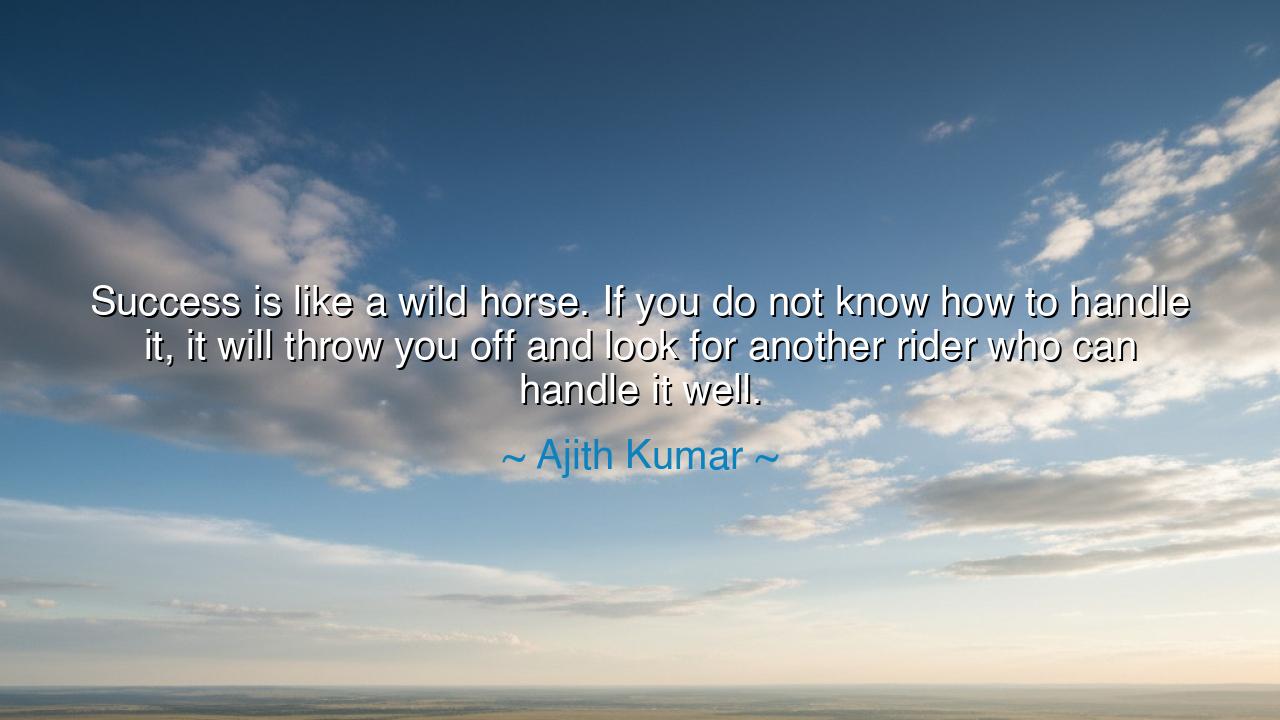
Success is like a wild horse. If you do not know how to handle
Success is like a wild horse. If you do not know how to handle it, it will throw you off and look for another rider who can handle it well.






Hear, O seekers of triumph, the words of Ajith Kumar, who proclaimed: “Success is like a wild horse. If you do not know how to handle it, it will throw you off and look for another rider who can handle it well.” This saying is not mere metaphor, but a vision of the fierce and untamed nature of success. For success, like the wild horse, is powerful, swift, and alluring, yet dangerous to those who are unprepared. To mount it is to feel the surge of glory; but without discipline, humility, and skill, one is cast down, and the horse runs on, seeking another worthy master.
For behold, many have dreamed of success, yet few have learned to ride it. The moment of triumph comes, and the crowd shouts, and the heart swells with pride. But if the rider clings only to arrogance or grows careless in his grip, the wild horse bucks, and the fall is hard. History is filled with men who rose to great heights, only to tumble because they could not govern the very power they had sought. Thus Ajith Kumar warns: success is not an end, but a trial, a test of character.
Consider the tale of Alexander the Great. In his youth, he tamed Bucephalus, the mighty horse none could ride. In this act, he revealed the very truth of this saying: greatness belongs not to those who merely desire, but to those who can command with wisdom and restraint. Later, as conqueror of empires, Alexander rode the wild horse of success across continents. Yet even he, unchecked by moderation, was cast down—not by enemies, but by excess, pride, and the weight of his own victories. His story teaches that handling success requires more than courage—it requires balance and wisdom.
So too we recall the emperors of Rome. Some, like Augustus, learned to harness success, ruling with patience and stability, guiding the empire into peace. Others, like Nero, lost the reins, consumed by vanity and indulgence. The horse of success, unwilling to be abused, cast them down, leaving their names as warnings to future generations. The same wild horse that carried them to glory trampled them in ruin when they failed to honor its power.
Mark this wisdom well: to handle success is to master oneself. The wild horse responds not to cruelty, nor to weakness, but to steady hands, a calm heart, and clear vision. The true rider does not clutch at pride, nor does he grow careless with his gift. He remembers always that the horse is not his possession, but a force entrusted to his guidance. In this way, success becomes not a curse but a companion, carrying him further than he could have walked alone.
The lesson is plain: if success comes to you, receive it with gratitude, but hold it with discipline. Do not let pride blind you, nor let arrogance loosen your grip. Instead, prepare yourself by cultivating humility, perseverance, and wisdom long before the horse arrives. For when success comes, it comes swiftly, and only those ready in spirit may ride it long without being thrown.
Practical wisdom calls for this: when fortune lifts you high, remember the ground from which you came. Treat others with respect, even in your glory. Continue to labor, even when comfort tempts you to rest. Seek counsel, guard your heart from vanity, and use your success for the good of others. In this way, you will not only ride the wild horse—you will guide it, and its strength will carry you to enduring legacy.
Thus, beloved, remember the words of Ajith Kumar: success is a wild horse. Desire it not lightly, nor mount it without preparation. For it can lift you to greatness or dash you upon the earth. But if you master it with wisdom and humility, it will bear you far, and your journey shall shine as a beacon for those who ride after you.






AAdministratorAdministrator
Welcome, honored guests. Please leave a comment, we will respond soon